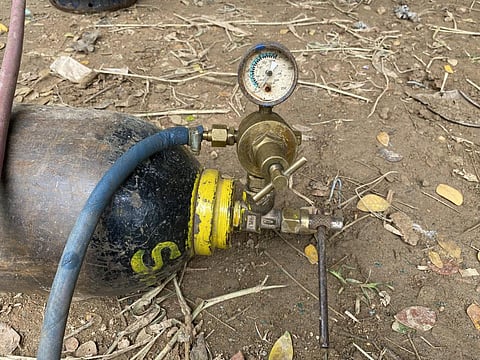

India’s COVID-19 toll has been a contentious topic, with government figures about a tenth of the World Health Organization (WHO) estimate of 4.7 million.
Oxygen shortage during the deadly second wave in 2021 was a key reason for the large number of fatalities, according to health experts. But the national health ministry has vehemently denied the accusation.
Expressing being disturbed by this, a parliamentary committee has now recommended the union health ministry to conduct an audit of deaths due to oxygen shortage.
In its 137th report submitted in Rajya Sabha on September 12, 2022, the committee sought details from states and Union territories (UTs) to furnish evidence of COVID-19 deaths due to oxygen shortage.
None of the 20 states / UTs which responded confirmed any such link. “The Committee takes into account the media reports that there were many deaths due to oxygen shortage in the hospitals. However, the sheer negligence of the fact shows the absence of empathy in the government parlance,” the report noted.
The lapse is even more glaring given the committee, in its 123rd report presented in November 2020, had urged the government to strengthen the healthcare infrastructure, specifically mentioning ensuring adequate oxygen supply.
“The government failed to manage even distribution of oxygen in states and amidst the skyrocketing demand it could not maintain a steady flow of oxygen leading to an unprecedented medical crisis,” the panel said.
The 137th report further illustrated the absence of definite guidelines to identify deaths due to lack of oxygen, with most deaths being attributed to comorbidities.
The report underlined the urgent need for transparency and accountability from government agencies. The health ministry must “enable robust documentation of the covid deaths that will in fact generate the responsive and responsible sense of government and cautious formulation of policy and combat situational health care emergency”, it added.
India is among the countries with the highest COVID-19 cases in the world. Addressing this statistic in the backdrop of a weak healthcare system — with the pandemic highlighting several fissures such as insufficient workforce — the report accused the government of failing to grasp the “gravity of pandemic and its subsequent waves”.
“Even when the trajectory of COVID-19 cases in the country registered a decline in the aftermath of the first wave, the government should have continued its efforts to monitor the resurgence of COVID-19 situation and its possible outrage in the country,” the report noted.
A robust surveillance system would have allowed us to identify the more virulent strain of the SARS-CoV-2 virus and perhaps cushion the devastating outcome to some extent, saving many lives.
Genome sequencing is a key tool for such surveillance efforts. However, the Indian SARS-CoV-2 Genomics Consortium (INSACOG) has not sequenced nearly enough samples given the volume of cases in India.
As per the June 20 bulletin, INSACOG submitted sequenced 256,599 samples. Given we now better understand the mutating nature of this virus, the report “strongly advises the government that there is an urgent need to expand the genome sequencing machinery in the country to keep a track of (it).”
While we have some more clarity on the origins of the SARS-CoV-2 pandemic, the panel has urged the central government to appeal to the nations to conduct more studies and penalise the culprits.
Doubts around this facet can have biosafety implications, a better understanding is paramount to prevent future risks.